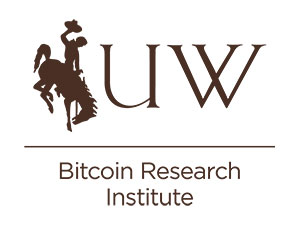New UW Bitcoin Research Institute Asks Big Questions About Money
Published August 02, 2024

The new Bitcoin Research Institute at the University of Wyoming is asking the big questions about bitcoin -- and money in general. It is the first university institute dedicated to the study of bitcoin.
The institute was established with the support of a major gift from Mark Casey, an equity portfolio manager at Capital Group.
“I am excited to see the positive impact the Bitcoin Research Institute at the University of Wyoming will have on the quality and quantity of academic research about bitcoin,” Casey says.
Is money -- and digital currency, such as bitcoin -- a medium of exchange, a unit of value, an instrument of power or a social contract? Is money defined by how it functions in society and the trust it creates, or does it have intrinsic value? Does the value of a person correlate with how much money they have? How does bitcoin differ from traditional money -- a fiat currency, such as the U.S. dollar?
Other questions include the impact bitcoin has on the environment and how it can undermine established authorities in good ways and bad -- its use as resistance money.
There has been little academic research on bitcoin, especially outside of computer science and economics. It is a complex topic, and there are many misconceptions. UW’s Bitcoin Research Institute seeks to fill this very large gap.
“Establishing a Bitcoin Research Institute in the College of Arts and Sciences is an important step in exploring the impacts of bitcoin on our society,” says Scott Turpen, dean of the College of Arts and Sciences. “By researching bitcoin’s economic, cultural and social implications, this institute will offer valuable insights that bridge technology and the humanities, fostering a deeper understanding of how bitcoin can shape the future of human interactions and global economies.”
Bitcoin is the first cryptocurrency. It was introduced in 2009 by someone going by the pseudonym Satoshi Nakamoto. Bitcoin is a peer-to-peer electronic cash system that operates without the need for a central authority.
Bitcoin challenges the traditional view of money in that it is natively digital and decentralized. Bitcoin was developed as a trustless system relying on decentralization and cryptographic proofs. Because it takes out the middleman -- disintermediation -- it challenges existing power structures, offering an alternative model to currency.
The purpose of the Bitcoin Research Institute is to create an international hub of philosophical, economic and scientific thinking and research on bitcoin and to increase the quality and impact of bitcoin research in general.
This cutting-edge institute supports peer-reviewed academic research into bitcoin and theory of money in the areas of philosophy, economics and interdisciplinary studies. Its work will inform the work of academics, policymakers, journalists and the public.
The institute supports high-quality academic research, creates faculty positions and encourages undergraduates and graduate students to pursue projects related to bitcoin. It helps educators and educational institutions develop curriculum, certifications and microcredentials. It is establishing a community of researchers, reading groups, workshops, events, community engagement and publications by people who understand bitcoin.
The institute is interdisciplinary, drawing on the expertise of the following UW units: Department of Philosophy and Religious Studies, Department of Economics, School of Computing, Center for Blockchain and Digital Innovation, School of Energy Resources, Haub School of Environment and Natural Resources, and Center for Subsurface Energy and Digital Innovation.
The institute’s inaugural director is Bradley Rettler, an associate professor in UW’s Department of Philosophy and Religious Studies. Rettler also is a fellow at the nonprofit Bitcoin Policy Institute, a think tank studying the future of money. In addition to his work on bitcoin, Rettler studies and teaches metaphysics, the philosophy of religion, epistemology, critical thinking, the philosophy of language, money and philosophy, and science fiction.

“I’m very excited to launch the Bitcoin Research Institute at the University of Wyoming,” Rettler says. “Bitcoin’s rapid growth and disciplinary overlap have left academics scrambling to make sense of it. The institute will provide much-needed education and support for those trying to make sense of this new monetary phenomenon.”
Rettler is a co-author of a new bestselling book, along with Andrew Bailey (Yale) and Craig Warmke (Northern Illinois), titled “Resistance Money: A Philosophical Case for Bitcoin.” The book makes the case that bitcoin empowers ordinary people to resist authoritarians, inflation, surveillance, censorship and financial exclusion.
The book also argues that bitcoin is not just for criminals, speculators or wealthy Silicon Valley entrepreneurs -- it is a tool for anyone on the margins. The book evaluates bitcoin from a global perspective and examines monetary policy, censorship-resistance, privacy, inclusion and energy use related to bitcoin. It makes the case that bitcoin is a net benefit to the world, despite the technology’s imperfections.
This UW institute is timely for another reason -- the state itself. Wyoming has a positive regulatory and legislative environment for bitcoin through its legal framework for blockchain, which is the technology that undergirds bitcoin. Wyoming’s proximity to renewable energy, such as wind and solar, make it perfect for bitcoin mining.
Additionally, Wyoming’s economic development is bolstered through education, partnerships and mentoring around bitcoin. Last, but not least, the institute helps prepare students for thinking about money and finance in an increasingly digital world.
The new Bitcoin Research Institute fills a research gap in the ever-evolving world of bitcoin. It also develops the philosophical underpinnings of the blockchain revolution, in which Wyoming leads the nation and the world.

